Related Research Articles
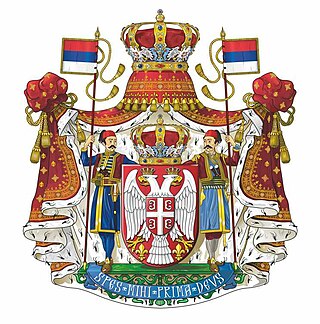
The House of Karađorđević or Karađorđević dynasty is the name of the former ruling Serbian and deposed Yugoslav royal family.

Peter II Karađorđević was the last king of Yugoslavia, reigning from October 1934 until he was deposed in November 1945. He was the last reigning member of the Karađorđević dynasty.

The Kingdom of Yugoslavia was a country in Southeast and Central Europe that existed from 1918 until 1941. From 1918 to 1929, it was officially called the Kingdom of Serbs, Croats, and Slovenes, but the term "Yugoslavia" was its colloquial name due to its origins. The official name of the state was changed to "Kingdom of Yugoslavia" by King Alexander I on 3 October 1929.
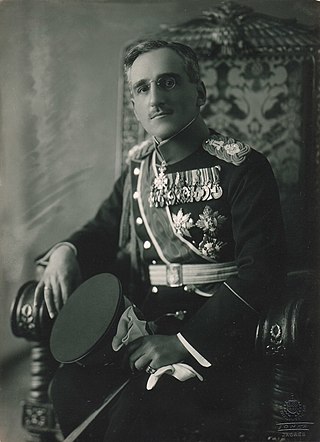
Alexander I, also known as Alexander the Unifier, was King of the Serbs, Croats and Slovenes from 16 August 1921 to 3 October 1929 and King of Yugoslavia from 3 October 1929 until his assassination in 1934. His reign of 13 years is the longest of the three monarchs of the Kingdom of Yugoslavia.

Maria, known in Serbian as Marija Karađorđević, was Queen of the Serbs, Croats and Slovenes from 1922 to 1929 and Queen of Yugoslavia from 1929 to 1934 as the wife of King Alexander I. She was the mother of King Peter II. Her citizenship was revoked, and her property was confiscated by the Yugoslav communist regime in 1947, but she was posthumously rehabilitated in 2014.
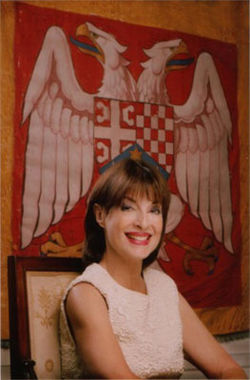
Princess Elizabeth of Yugoslavia is a member of the royal House of Karađorđević, a human rights activist and a former presidential candidate for Serbia. Yugoslavia abolished its monarchy in 1945 and decades later broke up into several countries.
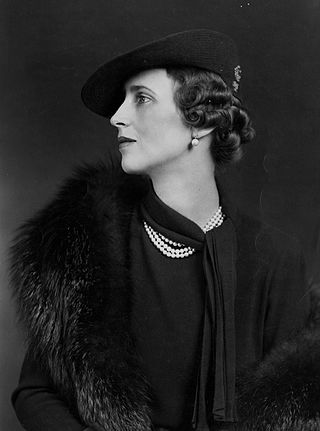
Princess Olga of Greece and Denmark was a Greek princess who married Prince Paul, Regent of the Kingdom of Yugoslavia. After her marriage, she was known as Princess Paul of Yugoslavia.
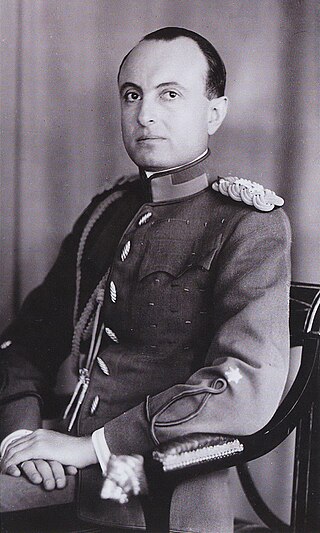
Prince Paul of Yugoslavia, also known as Paul Karađorđević, was prince regent of the Kingdom of Yugoslavia during the minority of King Peter II. Paul was a first cousin of Peter's father, Alexander I.

Prince Tomislav of Yugoslavia was a member of the House of Karađorđević, the second son of King Alexander I and Queen Maria of Yugoslavia. He was a younger brother of King Peter II of Yugoslavia and a former nephew-in-law to Queen Elizabeth II and Prince Philip.

Jovan Ristić was a Serbian politician, diplomat and historian.
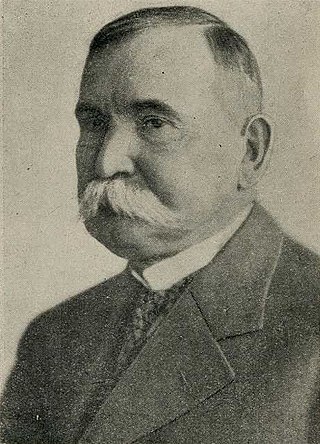
Nikola Uzunović was a Serbian politician who served as Prime Minister of Yugoslavia on two occasions.
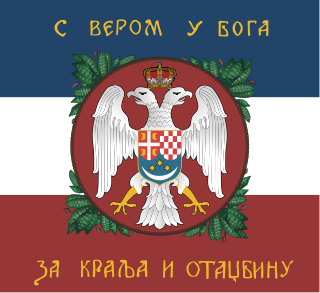
The Yugoslav Army, commonly the Royal Yugoslav Army, was the land warfare military service branch of the Kingdom of Yugoslavia. It existed from the Kingdom's formation in December 1918, until its surrender to the Axis powers on 17 April 1941. Aside from fighting along the Austrian border in 1919 and 1920 related to territorial disputes, and some border skirmishes on its southern borders in the 1920s, the JV was not involved in fighting until April 1941 when it was quickly overcome by the German-led invasion of Yugoslavia.

Bogoljub Jevtić was a Serbian diplomat and politician in the Kingdom of Yugoslavia.

Milan Grol was a Serbian literary critic, historian and politician. He was also director of the National Theatre in Belgrade.

The 6 January Dictatorship was a royal dictatorship established in the Kingdom of Serbs, Croats and Slovenes by King Alexander I with the ultimate goal to create a Yugoslav ideology and a single Yugoslav nation. It began on 6 January 1929, when the king prorogued parliament and assumed control of the state, and ended with the 1931 Yugoslav Constitution.

The Yugoslav coup d'état took place on 27 March 1941 in Belgrade, Kingdom of Yugoslavia, when the regency led by Prince Paul of Yugoslavia was overthrown and King Peter II fully assumed monarchical powers. The coup was planned and conducted by a group of pro-Western Serbian-nationalist Royal Yugoslav Air Force officers formally led by the Air Force commander, General Dušan Simović, who had been associated with several putsch plots from 1938 onwards. Brigadier General of Military Aviation Borivoje Mirković, Major Živan Knežević of the Yugoslav Royal Guards, and his brother Radoje Knežević were the main organisers in the overthrow of the government. In addition to Radoje Knežević, some other civilian leaders were probably aware of the takeover before it was launched and moved to support it once it occurred, but they were not among the organisers. Peter II himself was surprised by the coup, and heard of the declaration of his coming-of-age for the first time on the radio.
Borivoje Mirković was a brigadier general in the Royal Yugoslav Air Force.
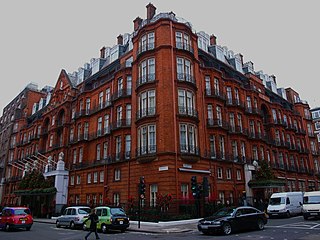
The Government of the Kingdom of Yugoslavia in Exile was an official government-in-exile of Yugoslavia, headed by King Peter II. It evacuated from Belgrade in April 1941, after the Axis invasion of the country, and went first to Greece, then to Palestine, then to Egypt, and finally, in June 1941, to the United Kingdom. Hence, it is also referred to as the "Government in London".
Vojvoda from old Serbian was the highest rank in the army of the Kingdom of Serbia and Kingdom of Yugoslavia from 1901 until end of Second World War in 1945. It has roots from the medieval term Voivode used during medieval Kingdom, Empire and Principality of Serbia. Vojvoda in medieval and later principality of Serbia had similar meaning as Duke title in other feudal states as it was military and noble title. In modern military terms the rank of Vojvoda is comparable with Field marshal and Generalfeldmarschall but since it can be an honorable title it is not always a military rank of a commissioned military officer.
References
- ↑ Hoptner 1962, p. 25.
- ↑ Hoptner 1962, p. 26.